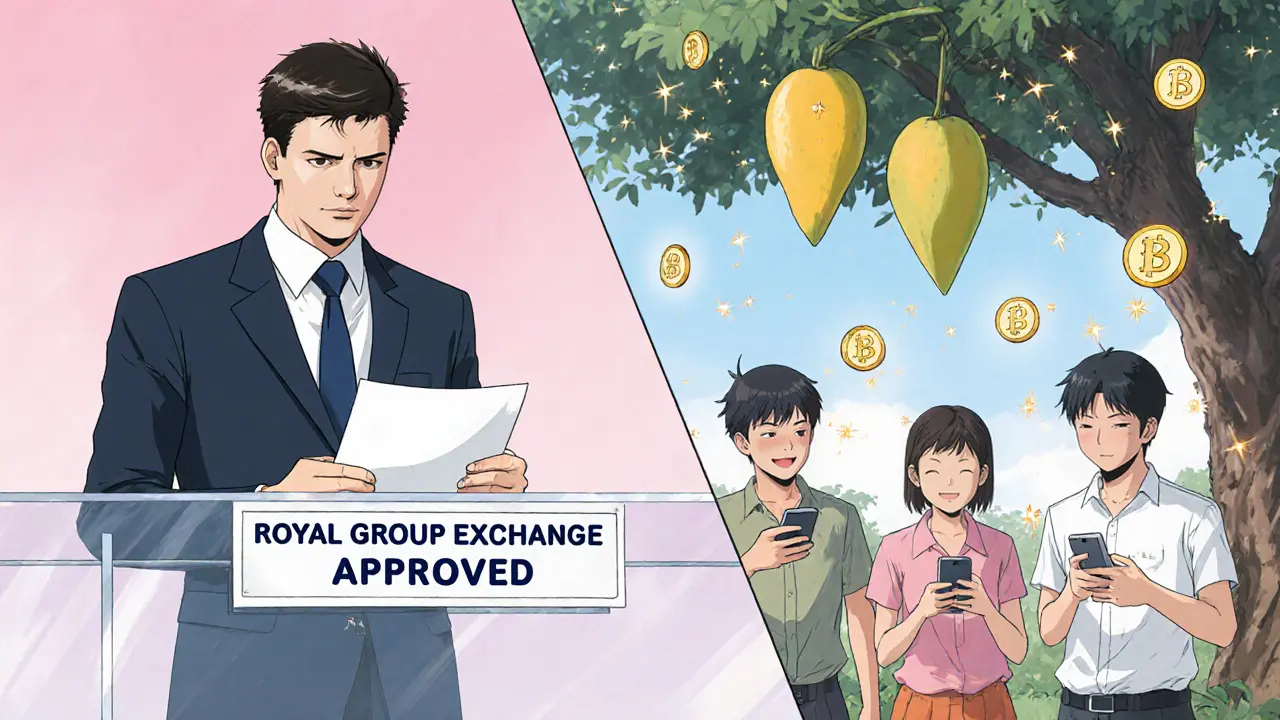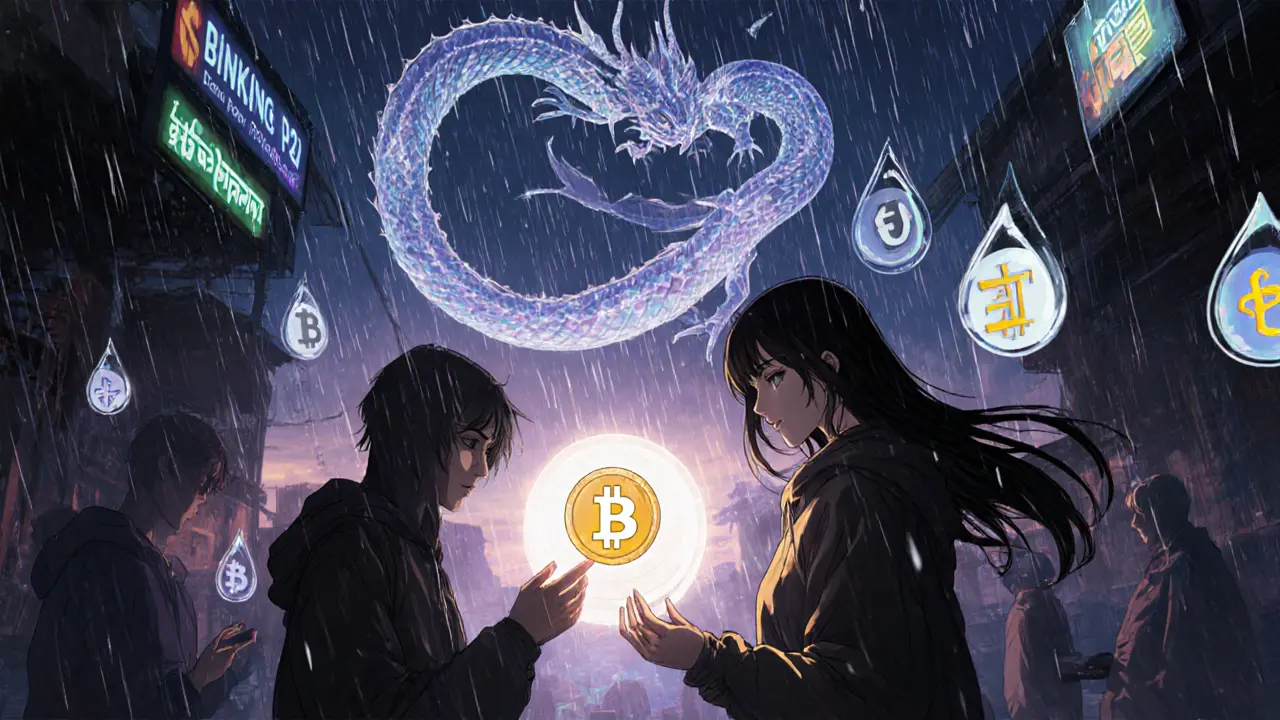Cambodia Banking Restrictions on Crypto Transactions: What You Need to Know in 2025

Cambodia’s banks can’t touch Bitcoin - and here’s why it’s breaking the system
In Cambodia, you can’t use Bitcoin to pay your phone bill. You can’t send crypto to a friend through your bank app. Even if you hold Bitcoin in a wallet, your local bank - whether it’s ABA, Wing, or Canadia - will freeze your account if they spot a crypto transaction. This isn’t a glitch. It’s policy. Since early 2025, the National Bank of Cambodia (NBC) has enforced one of the strictest crypto banking bans in Southeast Asia.
It’s not that crypto is illegal in Cambodia. It’s that banks are forbidden from touching it - unless they’re one of two licensed players. And even then, the rules are so tight they’re practically suffocating innovation.
How the ban works: Group 1 vs. Group 2
The NBC’s 2025 regulation, Prakas B7-024-735, created a two-tier system that controls everything:
- Group 1: Tokenized securities and stablecoins fully backed by real assets - like USDT or USDC, if they meet NBC’s approval.
- Group 2: Everything else - Bitcoin, Ethereum, Solana, Dogecoin. These are banned from bank balance sheets entirely.
Commercial banks can offer services for Group 1 assets - like converting riel to USDT or holding crypto in custody - but only after NBC approval. And even then, they can’t hold more than 15% of their Tier 1 capital in crypto. That’s half the limit allowed in Thailand and far below Singapore’s open approach.
But here’s the catch: only two companies have been approved so far - Royal Group Exchange and platforms built on Bakong, Cambodia’s homegrown blockchain payment system. That means if you want to legally trade crypto, you’re stuck with one of two gatekeepers.
Why the crackdown? Sanctions, scams, and stability
Cambodia didn’t wake up one day and decide to ban crypto out of nowhere. The pressure came from abroad - and from home.
In September 2024, the U.S. Treasury’s OFAC sanctioned Ly Yong Phat and his L.Y.P. Group for running online scam centers where trafficked workers were forced to run crypto fraud schemes. These weren’t just random criminals - they were tied to resorts, hotels, and businesses that used crypto to launder money. The crackdown that followed was brutal.
On December 3, 2024, Cambodia’s telecom regulator blocked 16 offshore exchanges - including Binance, Coinbase, and OKX. No more direct access. No more P2P trading through apps. Banks were ordered to flag any transaction linked to these platforms.
The NBC’s goal? Protect the country’s $28 billion banking sector from a repeat of Thailand’s $100 million Bitkub exchange collapse. They’re betting that by keeping crypto out of the formal system, they avoid financial chaos.

What happens when you try to use crypto anyway?
If you’re a regular Cambodian trying to use crypto, you’re likely to run into trouble.
Reddit user ‘PhnomPenhTechie’ tried sending three $50 transfers via Binance P2P in January 2025. His Wing Money account got frozen for 14 days. No warning. No explanation. Just locked.
Trustpilot reviews for Wing and ABA show a 2.1/5 rating for crypto services. Most complaints? “Too many documents.” “Too slow.” “They don’t tell you why they blocked it.”
Even approved services are a hassle. To get verified on Royal Group Exchange, you need your national ID, a utility bill, and a 3-day wait. Daily limits are capped at $5,000. Fees are 0.8% - not bad, but the system is so slow that users report 15-day delays converting riel to USDT.
Meanwhile, the unbanked - 68% of rural Cambodians - are hit hardest. They can’t use banks. They can’t use crypto through banks. And the government isn’t offering them a bridge.
Bakong: Cambodia’s alternative to crypto
The NBC isn’t trying to kill digital money - it’s trying to replace it.
Bakong, launched in 2020 with help from Japan, is Cambodia’s central bank digital currency (CBDC) platform. As of late 2024, it’s used by 12.4 million people - 65% of the population - across 62 banks and 8,600 merchants. It’s fast, cheap, and government-controlled.
Unlike Bitcoin, Bakong transactions settle in seconds. No volatility. No offshore exchanges. No sanctions risk. The NBC calls it the future. And they’re not budging.
“Cambodia will not recognize private cryptocurrencies as legal tender until our Bakong CBDC achieves full stability,” said NBC Governor Chea Chanto in November 2024.
But here’s the irony: Bakong doesn’t connect to open blockchains. It’s a closed loop. That means it can’t do what crypto does best - enable cross-border payments without intermediaries. Remittances still cost 6.8% in Cambodia. In Laos, where crypto corridors are allowed, it’s 4.2%.

The hidden cost: underground crypto and lost opportunity
The ban didn’t stop crypto use - it just pushed it underground.
Chainalysis data shows illicit crypto activity in Cambodia jumped 37% in 2024. Meanwhile, legitimate crypto adoption dropped from 4.7% of the population in 2021 to just 2.1% in 2024.
And then there’s the money flowing through sanctioned entities. In 2024, South Korean exchange Bithumb processed $8.93 million in USDT transactions with Huione Guarantee - a company sanctioned by the U.S. for money laundering. That’s a 1,400x increase from the year before.
Experts are divided. Dr. Sophal Ear says the ban protects riel stability and keeps inflation low (6.2% vs. 15.3% regional average). But David Kust of Kapronasia argues: “The ban has driven transactions underground. Legitimate financial inclusion has stalled.”
Startups are caught in the middle. AgriTech firm RiceX raised $2 million in stablecoin funding in December 2024 - but it took 10 days of paperwork and NBC approval. “Worth it for certainty,” they said. But most small businesses don’t have the time or lawyers to navigate this.
The future: More restrictions, or a shift?
The NBC’s 2025-2026 roadmap is clear: tighten controls.
- All crypto-fiat conversions must be monitored in real-time.
- P2P platforms will face new restrictions.
- No bank will be allowed to process transactions with unlicensed offshore exchanges - ever.
The IMF warns this could cost Cambodia $1.2 billion in missed fintech investment by 2027. But the NBC isn’t swayed. Their priority isn’t innovation. It’s control.
For now, Cambodia’s crypto scene looks like a locked room with one key - and only two people holding it. Everyone else is left outside, wondering if the door will ever open.
What’s next for Cambodians who want to use crypto?
If you’re a Cambodian trying to use crypto legally, here’s what you need to know:
- Only Royal Group Exchange and Bakong-based platforms are approved. Everything else is risky.
- Never use Binance, Coinbase, or OKX directly. Your bank will freeze your account.
- Stablecoins like USDT are your best bet - but only if you go through an NBC-approved channel.
- Expect delays. Approval for crypto services takes 90-120 days for banks. For users, it’s 3-15 days.
- Keep records. If you’re flagged, you’ll need proof of source of funds - utility bills, pay stubs, tax docs.
For now, the safest path is to stick with Bakong. It’s not crypto. But it’s fast, legal, and growing every day.
Is Bitcoin illegal in Cambodia?
Bitcoin isn’t technically illegal to own in Cambodia, but banks are banned from handling it. You can hold Bitcoin in a personal wallet, but if your bank detects a transaction linked to Bitcoin or any unapproved crypto exchange, they’ll freeze your account. The National Bank of Cambodia considers Bitcoin a Group 2 cryptoasset - meaning it’s off-limits for all licensed financial institutions.
Can I use Binance or Coinbase in Cambodia?
No. As of December 2024, Cambodia’s telecom regulator blocked access to Binance, Coinbase, OKX, and 13 other offshore exchanges. Even if you use a VPN, your bank will flag any P2P transactions tied to these platforms. Using them risks account freezes, fines, or even legal action if linked to sanctioned entities.
What is Bakong, and how is it different from crypto?
Bakong is Cambodia’s official central bank digital currency (CBDC) platform, developed with help from Japan. Unlike Bitcoin or Ethereum, Bakong isn’t decentralized. It’s fully controlled by the National Bank of Cambodia. Transactions are instant, low-cost, and use the riel or US dollar. It’s designed to replace cash and traditional banking - not to compete with crypto. While crypto is volatile and unregulated, Bakong is stable and government-backed.
Can I send crypto to someone in Cambodia?
You can send crypto to a Cambodian wallet, but the recipient can’t cash it out through their bank unless they use Royal Group Exchange or a Bakong-integrated service. Most banks will freeze accounts that receive crypto from unapproved sources. The only legal way to convert crypto to riel is through NBC-approved channels - and even then, it’s slow and capped.
Why does Cambodia allow stablecoins but not Bitcoin?
Stablecoins like USDT are pegged to the U.S. dollar and are considered “tokenized securities” under NBC rules. They’re seen as less risky because their value doesn’t swing wildly. Bitcoin, on the other hand, is volatile and unbacked - so the NBC treats it as a high-risk asset. The goal is to allow digital money that behaves like traditional currency, while blocking speculative assets that could destabilize the banking system.
Are there any legal crypto exchanges in Cambodia?
Yes - but only two: Royal Group Exchange and platforms built on Bakong. Both are licensed by the Securities and Exchange Regulator of Cambodia (SERC) under its FinTech Regulatory Sandbox. All other exchanges, even those based in Asia, are blocked and considered illegal. If you’re using any other platform, you’re operating outside the law - and your bank may take action.
How do I avoid having my bank account frozen for crypto activity?
Never use offshore exchanges. Don’t send or receive crypto through P2P apps like Binance P2P. Only use Royal Group Exchange or Bakong-integrated services. Keep all documentation - ID, utility bills, transaction records - in case your bank asks. Avoid any transaction over $3,000 without prior approval. And never use crypto to pay for goods or services if the recipient is a bank account - it will trigger a flag.

Hamish Britton
November 14, 2025 AT 06:04Hannah Kleyn
November 14, 2025 AT 06:43Rachel Anderson
November 15, 2025 AT 23:47Robert Astel
November 17, 2025 AT 07:03Kandice Dondona
November 17, 2025 AT 08:37Kelly McSwiggan
November 18, 2025 AT 18:46Cherbey Gift
November 19, 2025 AT 23:05Kevin Hayes
November 21, 2025 AT 01:35Drew Monrad
November 21, 2025 AT 18:12Vanshika Bahiya
November 22, 2025 AT 11:26Albert Melkonian
November 24, 2025 AT 00:07anthony silva
November 24, 2025 AT 02:12Andrew Parker
November 25, 2025 AT 21:50Byron Kelleher
November 26, 2025 AT 23:01ratheesh chandran
November 28, 2025 AT 19:29Mandy Hunt
November 30, 2025 AT 06:50sandeep honey
December 1, 2025 AT 11:41Becky Shea Cafouros
December 2, 2025 AT 10:17Katherine Wagner
December 3, 2025 AT 09:07Cody Leach
December 3, 2025 AT 17:55Anthony Forsythe
December 3, 2025 AT 21:39gary buena
December 3, 2025 AT 22:06